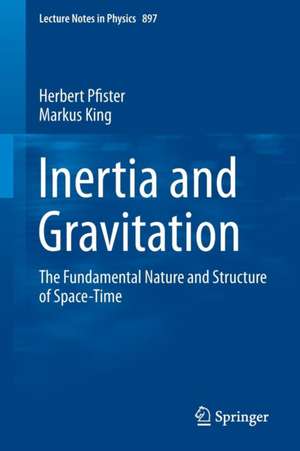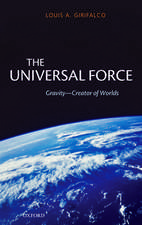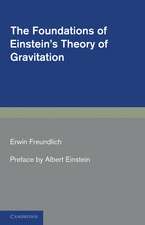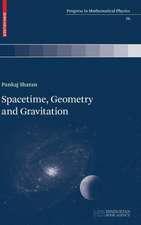Inertia and Gravitation: The Fundamental Nature and Structure of Space-Time: Lecture Notes in Physics, cartea 897
Autor Herbert Pfister, Markus Kingen Limba Engleză Paperback – 20 mar 2015
Din seria Lecture Notes in Physics
- 19%
 Preț: 424.00 lei
Preț: 424.00 lei - 17%
 Preț: 360.73 lei
Preț: 360.73 lei -
 Preț: 429.22 lei
Preț: 429.22 lei - 17%
 Preț: 427.62 lei
Preț: 427.62 lei - 17%
 Preț: 460.26 lei
Preț: 460.26 lei - 15%
 Preț: 590.95 lei
Preț: 590.95 lei -
 Preț: 481.93 lei
Preț: 481.93 lei - 17%
 Preț: 494.66 lei
Preț: 494.66 lei -
 Preț: 281.90 lei
Preț: 281.90 lei - 17%
 Preț: 493.20 lei
Preț: 493.20 lei - 17%
 Preț: 426.72 lei
Preț: 426.72 lei -
 Preț: 365.15 lei
Preț: 365.15 lei -
 Preț: 280.82 lei
Preț: 280.82 lei - 17%
 Preț: 361.44 lei
Preț: 361.44 lei -
 Preț: 374.52 lei
Preț: 374.52 lei -
 Preț: 407.98 lei
Preț: 407.98 lei - 20%
 Preț: 428.13 lei
Preț: 428.13 lei -
 Preț: 263.30 lei
Preț: 263.30 lei - 15%
 Preț: 593.73 lei
Preț: 593.73 lei - 15%
 Preț: 528.13 lei
Preț: 528.13 lei -
 Preț: 493.12 lei
Preț: 493.12 lei - 17%
 Preț: 425.68 lei
Preț: 425.68 lei -
 Preț: 280.65 lei
Preț: 280.65 lei -
 Preț: 163.41 lei
Preț: 163.41 lei - 18%
 Preț: 726.59 lei
Preț: 726.59 lei -
 Preț: 394.84 lei
Preț: 394.84 lei - 15%
 Preț: 709.63 lei
Preț: 709.63 lei - 15%
 Preț: 623.90 lei
Preț: 623.90 lei - 20%
 Preț: 476.93 lei
Preț: 476.93 lei - 15%
 Preț: 428.05 lei
Preț: 428.05 lei -
 Preț: 342.78 lei
Preț: 342.78 lei - 18%
 Preț: 851.93 lei
Preț: 851.93 lei -
 Preț: 346.61 lei
Preț: 346.61 lei -
 Preț: 391.57 lei
Preț: 391.57 lei - 15%
 Preț: 633.16 lei
Preț: 633.16 lei -
 Preț: 451.71 lei
Preț: 451.71 lei - 5%
 Preț: 1497.80 lei
Preț: 1497.80 lei -
 Preț: 374.85 lei
Preț: 374.85 lei -
 Preț: 380.07 lei
Preț: 380.07 lei - 15%
 Preț: 516.14 lei
Preț: 516.14 lei - 15%
 Preț: 583.78 lei
Preț: 583.78 lei - 15%
 Preț: 508.60 lei
Preț: 508.60 lei -
 Preț: 469.73 lei
Preț: 469.73 lei -
 Preț: 388.90 lei
Preț: 388.90 lei - 15%
 Preț: 500.24 lei
Preț: 500.24 lei -
 Preț: 386.52 lei
Preț: 386.52 lei - 15%
 Preț: 472.88 lei
Preț: 472.88 lei -
 Preț: 424.27 lei
Preț: 424.27 lei -
 Preț: 380.07 lei
Preț: 380.07 lei
Preț: 464.23 lei
Nou
Puncte Express: 696
Preț estimativ în valută:
88.83€ • 96.79$ • 74.85£
88.83€ • 96.79$ • 74.85£
Carte tipărită la comandă
Livrare economică 24 aprilie-08 mai
Preluare comenzi: 021 569.72.76
Specificații
ISBN-13: 9783319150352
ISBN-10: 3319150359
Pagini: 180
Ilustrații: XII, 180 p. 14 illus.
Dimensiuni: 155 x 235 x 15 mm
Greutate: 2.99 kg
Ediția:2015
Editura: Springer International Publishing
Colecția Springer
Seria Lecture Notes in Physics
Locul publicării:Cham, Switzerland
ISBN-10: 3319150359
Pagini: 180
Ilustrații: XII, 180 p. 14 illus.
Dimensiuni: 155 x 235 x 15 mm
Greutate: 2.99 kg
Ediția:2015
Editura: Springer International Publishing
Colecția Springer
Seria Lecture Notes in Physics
Locul publicării:Cham, Switzerland
Public țintă
ResearchCuprins
Preface.- The Laws of Inertia and Gravitation in Newtonian Physics.- Free Particles and Light Rays as Basic Elements of General Relativity.- Einstein’s Field Equations, Their Special Mathematical Structure, and Some of Their Remarkable Physical Predictions.- Mach’s Principle, Dragging Phenomena, and Gravitomagnetism.- A Sketch of the Proof that the Inertial Path Structure Follows from a Local Desargues Property.- Slowly Rotating Mass Shells with Flat Interiors.- Name Index.- Subject Index.
Textul de pe ultima copertă
This book focuses on the phenomena of inertia and gravitation, one objective being to shed some new light on the basic laws of gravitational interaction and the fundamental nature and structures of spacetime. Chapter 1 is devoted to an extensive, partly new analysis of the law of inertia. The underlying mathematical and geometrical structure of Newtonian spacetime is presented from a four-dimensional point of view, and some historical difficulties and controversies - in particular the concepts of free particles and straight lines - are critically analyzed, while connections to projective geometry are also explored. The relativistic extensions of the law of gravitation and its intriguing consequences are studied in Chapter 2. This is achieved, following the works of Weyl, Ehlers, Pirani and Schild, by adopting a point of view of the combined conformal and projective structure of spacetime. Specifically, Mach’s fundamental critique of Newton’s concepts of ‘absolute space’ and ‘absolute time’ was a decisive motivation for Einstein’s development of general relativity, and his equivalence principle provided a new perspective on inertia. In Chapter 3 the very special mathematical structure of Einstein’s field equations is analyzed, and some of their remarkable physical predictions are presented. By analyzing different types of dragging phenomena, Chapter 4 reviews to what extent the equivalence principle is realized in general relativity - a question intimately connected to the ‘new force’ of gravitomagnetism, which was theoretically predicted by Einstein and Thirring but which was only recently experimentally confirmed and is thus of current interest.
Caracteristici
Explores the conceptual and mathematical foundations of classical gravity and spacetime Connects new insights in the concept of Inertia with ongoing observational work Approachable and self-contained introduction for non-specialist researchers













